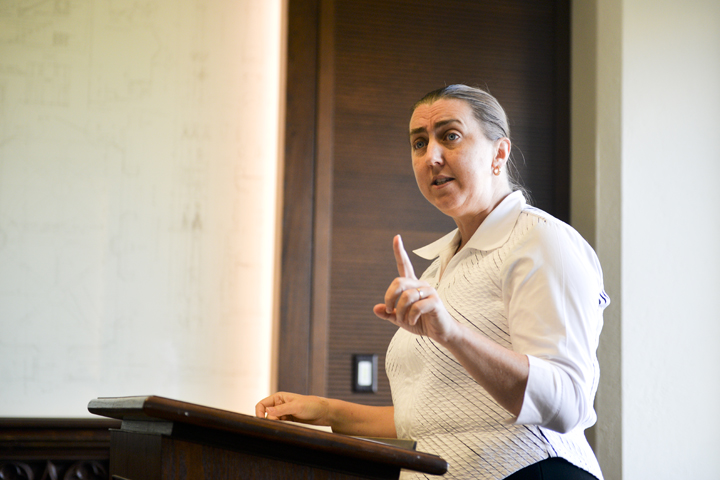Elon University professor discusses Title IX, mandatory reporting


Ann Cahill, professor of Philosophy at Elon University, speaks about mandatory reporting of sexual assault | Jordan Mondell, Assistant Visual Editor
Ann Cahill stood in front of a crowd Thursday afternoon and called for sexual assault survivors to be allowed one right: the freedom of silence.
For some survivors, talking about their experience — particularly talking with counselors or Title IX officers they aren’t familiar with — can aggravate their pain, Cahill, a professor of philosophy at Elon University, said. She added that even survivors who are ready to talk with people they know, including their professors, should be given the right to choose when and if their case is reported to their university’s Title IX office.
In a lecture Thursday afternoon, Cahill challenged Pitt’s current regulations –– which follow federal guidelines –– that say professors and other University employees have to report cases of sexual violence to the authorities, even if the victim of the violence would rather keep quiet. Changing these regulations, she told a crowd of about 40 people, would allow survivors to talk with any confidant they feel comfortable with and to report their cases at their own pace.
“Current policies place survivors of sexual assault at risk for further traumatization,” Cahill said.
Addressing this and related issues, Cahill gave three lectures Thursday as part of a series which the Gender, Sexuality and Women’s Studies program sponsored.
In addition to the legal aspects of Title IX regulations, Cahill focused specifically on whether or not survivors and their confidants have an ethical obligation to report their assaults to a higher authority.
Cahill was adamant about upholding the rights of survivors of sexual violence in part because such crimes are so prevalent on college campuses. According to the Chronicle of Higher Education’s Title IX Tracker there are 282 active sexual-violence investigations at 213 colleges as of Oct. 31.
And according to Pitt’s Campus Climate Survey released last September, 11.7 percent of female, 3.4 percent of male and 5.7 percent of “other gender” undergraduate students at Pitt have experienced unwanted sexual penetration or touching as a result of either force or incapacitation since they entered college.
Title IX policies frequently state, as Pitt’s does, that confidants –– those who sexual assault survivors open up to –– who are also university employees must relay any and all information they are given to the Title IX office.
“Survivors of sexual assault or harassment disclose information to confidants, often not thinking that the confidant must legally report the information disclosed,” Cahill said.
Yet because such policies are federally mandates, universities that do not do an appropriate job of handling situations of sexual assault in accordance with Title IX legislation risk losing their federal funding.
“Most colleges I’ve encountered haven’t strayed away from a blanket, or cover-all policy, simply because they fear facing implications from the government,” Cahill said. “In creating blanket policies, they want to cover all of their bases to prevent this from happening.”
Pitt’s Title IX policy and website make it clear that the University’s main goal is to protect all members of the community. Pitt requires employees to report all instances of sexual violence. This means that if a survivor trusts his or her story with someone who works for the University, that person is mandated and obligated to report incidents to the Title IX coordinator.
Pamela Connelly, associate vice chancellor for diversity and inclusion, oversees the Title IX office at Pitt and said she did not wish to comment for this story, directing questions to Katie Pope, the Title IX coordinator at Pitt.
According to Pope, Pitt’s policies are designed to protect survivors of sexual violence and ensure that a student doesn’t have to report their own sexual assault against their will.
“Certainly no survivor is obligated to report his or her assault to Title IX,” Pope said.
Cahill, though, said Title IX policies falter by requiring confidants to report regardless of the circumstances. She disagreed with policies like Pitt’s and argued that confidants should be allowed to respect the privacy of a survivor who opens up to them.
“My hope in giving these talks is that faculty and members of the University community engage in conversations about what problems blanket policies like Pitt’s entail,” Cahill said after her lecture. “The policies that the vast majority of higher education institutions have adopted in compliance of Title IX, render virtually all faculty or staff as mandatory reporters in a mechanism of defense.”
Kevin Hudson, a junior humanities area major, attended the event after hearing about others experiences with the policies.
“I know people who have been through this process, and I wanted to understand what Title IX actually entails,” Hudson said. “Now, knowing that, I understand why some survivors find the process difficult.”
After a sexual assault is reported, the University has to open an investigation. Cahill argued that students might not be interested in beginning that process, but are just trying to seek an understanding person to talk with.
Todd Reeser, program director for GSWS, said that because all Pitt staff members are mandatory reporters, some conversations which come up in relation to lectures –– especially within the GSWS department –– qualify as incidents that must be reported.
“Because of this, we wanted to bring someone to the University who could speak on Title IX and help students understand just what exactly Title IX entails,” Reeser said.
Emily Migdal, an undeclared sophomore who has been a reporter for The Pitt News, disagreed with Cahill’s evaluation of Pitt’s Title IX office.
“As with most things, mandatory reporting doesn’t come without its faults. But I think, in a lot of ways, despite what Cahill said, it does more good than harm,” Migdal said. “I think that Pitt’s policy is definitely better than most universities, and for that I think we should be appreciative.”
Despite differing views, everyone in attendance agreed on the importance of supporting survivors.
“We do wrong by survivors when we imply that mandatory reporting is necessary,” Cahill said.
Recent Posts
A Good Hill to Die On // The motivation we all need
In this post of “A Good Hill to Die On,” staff writer Sierra O’Neil discusses…
Who Asked? // Is it really the damn phones?
This installment of Who Asked? by staff writer Brynn Murawski describes her brief journey limiting…
Students are ‘upset, but not surprised’ over denial of gender affirming care at UPMC CHP
Pitt students and LGBTQIA+ members express their concerns about the recent denial of gender affirming…
Take Madness Final Four | Battle of Pennsylvania, 412 and Just Outside of Philly clash
Welcome to the Final Four of Take Madness! We are down to four talented writers,…
Column | Best Sports Environments in Pittsburgh
Pittsburgh is undoubtedly one of the best sports cities in America. A deeply passionate fanbase…
Chalk is all the talk: Previewing the NCAA men’s Final Four
For the first time since 2008, all four first seeds have made the men’s Final…

